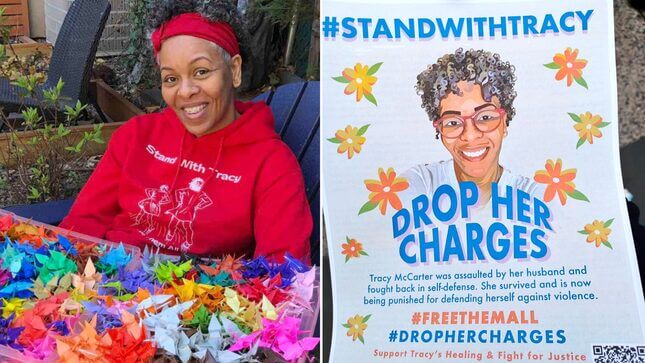Judge Dismisses Murder Charge Against Tracy McCarter, Who Stabbed Her Violent Ex in Self-Defense
McCarter, a Black woman, spent six months on Rikers Island in 2020 for physically defending herself against her abusive, white ex-husband.
JusticePolitics

A New York judge on Friday agreed to dismiss a murder charge against Tracy McCarter, a 47-year-old nurse and grandmother who stabbed her estranged, physically abusive ex-husband in self-defense. This ruling from state Supreme Court Judge Diane Kiesel comes after last month, Manhattan District Attorney Alvin Bragg moved to dismiss the case and wrote that he had “reasonable doubt” about McCarter’s guilt.
In what the New York Times characterized as “unusually personal terms,” Kiesel expressed hostility to Bragg’s decision to dismiss the case. “The court finds no compelling reason to dismiss the indictment, but for the district attorney’s unwillingness to proceed,” Kiesel wrote. But she conceded that “it is not in the interest of justice for the court to engage in a futile and unseemly standoff with the district attorney.”
For almost a year after being elected district attorney in November 2021, Bragg faced intense protest from local activists for declining to dismiss the charge against McCarter—despite having tweeted a year earlier from the campaign trail, “I #StandWithTracy. Prosecuting a domestic violence survivor who acted in self-defense is unjust,” along with an article about McCarter’s story. Around the time that Bragg tweeted this, McCarter was serving six months on Rikers Island at the height of the covid pandemic, awaiting indictment from a grand jury.
“I am innocent. And I am devastated that on March 2, 2020, a man whom I loved lost his life. We were both the victims of the cruel disease of alcoholism,” McCarter said in a press release Friday. “Dismissing the unjust charge against me can’t give back what I’ve lost, but I am relieved that this nightmare is over, and I am determined to once again thrive.”
-

-

-

-

-

-

-

-

-

-

-

-

-

-

-

-

-

-

-

-

-

-

-

-

-

-

-

-

-

-

-

-

-

-

-

-

-

-

-

-








































